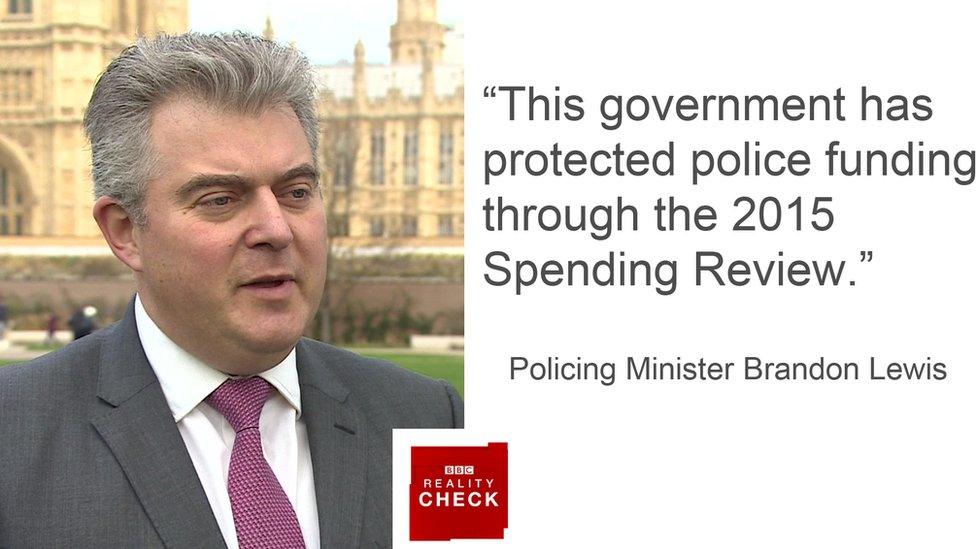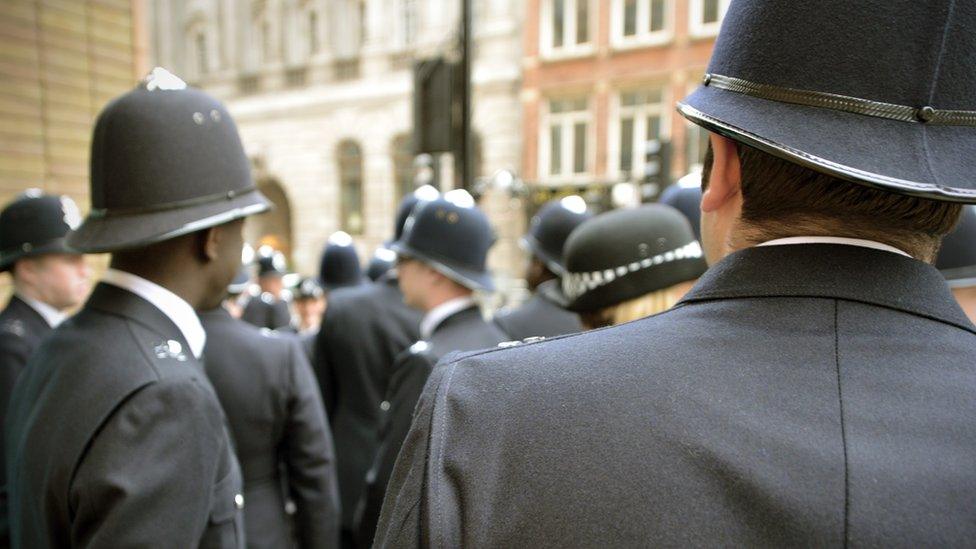Reality Check: Did the government protect police funding?
- Published

The claim: Failing police forces have "no excuse" because their budgets have been protected.
Reality Check verdict: Overall the police budget in England and Wales has been protected in real terms, but not every individual force will feel the benefit because the money is being targeted at specialist areas of policing. This relatively small funding boost comes off the back of five years of deep cuts.
In 2015, the government announced that overall police budgets would be protected. This meant the amount of money the police receive from the government would increase each year in line with inflation for the following five years.
The Minister for Policing, Brandon Lewis, flagged this in response to a report, external by the independent inspector of police forces, which found a "worrying" variation in the quality of policing across England and Wales, despite improvements overall.
Police funding in Scotland is devolved and Northern Ireland has different funding arrangements so they were not included in the report.
'No excuse'
The report was compiled by Her Majesty's Inspectorate of Constabulary (HMIC) and Mr Lewis said: "This Government has protected police funding, through the 2015 Spending Review.
"There can be no excuse for any force that fails to deliver on its obligations - those identified as inadequate or requiring improvement must take HMIC's findings very seriously and I expect to see rapid improvements."
The inspectorate had warned that some police forces were "struggling to respond to shrinking resources".
It is true to say that the overall policing budget was protected in real terms in 2015 but this figure disguises some regional variation. Part of the £900m extra funding over the following five years is going on specific areas of policing like cybercrime and tackling child sexual exploitation which are often dealt with regionally, so not every individual force will see the benefit of this uplift.
Austerity cuts
A Home Office statement at the time of the announcement said that it would provide funding to maintain individual police force budgets at current cash levels. Not every police force will necessarily receive enough money to keep up with inflation.
Spending on policing had been rising steadily for at least 15 years until austerity cuts began to kick in from 2010. It rose particularly rapidly in the 10 years to this date, going up by more than 30%.
Following the 2008 crash and the swathe of cuts to public spending that followed, the part of police forces' budgets that are paid for by central government shrunk by 22% on average.
Before the 2015 announcement there was already regional variation. This is in large part because of the two main ways policing is funded: through a grant from central government and council tax.
Different areas rely to different extents on the central government grant; for example last year Northumbria and the West Midlands police forces raised 12% of their revenue through council tax while Surrey raised almost half (49%) of its revenue in this way.
This often corresponds to how well-off an area is - generally poorer areas have lower tax takes and rely more on government grants. As these grants have reduced, a larger proportion of budgets is coming from council tax. Since the grant was cut by the same percentage around the country, areas that lean most heavily on central government money, and are the least able to raise money through council tax, will have felt those cuts most sharply.
Lean years
You can see this in the real-term reductions to funding, external in different police forces. Between 2010 and 2016 Northumbria suffered a 23% cut while in Surrey it was only 12%.
The areas that raised funding by the smallest amount during the previous good years have also experienced the biggest cuts in the lean years.
However, it is also worth noting that the variation in quality raised in the HMIC report does not correspond directly to how much budgets have been cut. Bedfordshire, the only force to be rated inadequate, experienced a cut over the last five years that was about average for the country - a 17% fall compared with a fall of 18% across England and Wales.
Durham, the only force to be rated outstanding, suffered an above average 20% cut.
Demographic differences
Of course, simply comparing budget cuts to performance does not take account of demographic differences and crime levels.
So while it is true to say that policing is being protected at least to some extent, this comes off the back of five years of deep cuts - cuts which feel larger relative to large increases in spending in the preceding years.



- Published2 March 2017
- Published25 November 2015
